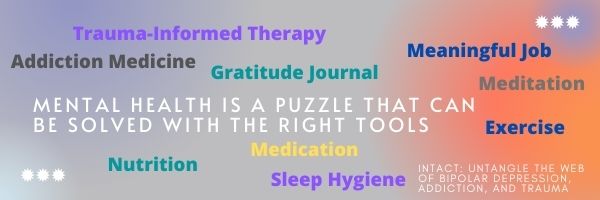May, mental health awareness month, makes me more aware than usual of the standard narrative that goes along with mental health—medication and therapy are the fixes. This May 60 Minutes aired U.S. kids grappling with mental health crisis made worse by the pandemic and it focused on the months-long wait time for teens to receive therapy but did not discuss what teens can do to lessen their anxiety and depression in the meantime, nor did it discuss the systemic and cultural conditions that breed anxiety and depression.
What research reveals
There’s so much more to the story. There’s so much more to the puzzle that comprises mental health. As gymnast extraordinaire Simone Biles said, “Physical health is mental health.” And many more components can play a role in someone going from impaired mental health to healthy, productive, and thriving.
Teens in Distress are Clogging Mental Health System, a recent New York Times article, does a much better job than the 60 Minutes episode at deciphering why the mental health of US teens has been declining since 2009. It’s not screen time per se, but, since 2009, teens have been sleeping less and exercising less.
Adequate sleep and exercise are critical for mental health. Our culture doesn’t value them enough. There’s a lot of talk about exercise, but if individuals have to commute two hours each way to work or juggle several part-time jobs, how can they possibly make time for exercise? Many teens are stretched thin with academics and activities in quest of college admission and scholarships. Others start working as early as 10th grade.
Increased use of social media can lead to isolation. Rapid Systematic Review: The Impact of Social Isolation and Loneliness on the Mental Health of Children and Adolescents in the Context of COVID-19 determines that adolescents tend to be adversely impacted for longer periods than adults after the isolation that leads to loneliness ends and that the length of time adolescents are lonely is more significant than the intensity of the loneliness. COVID led to isolation but so does being overbooked.
Q&A: He’s studied mental illness for 50 years. Here are all the things we’re doing wrong examines our mental health dilemma from the perspective of UC San Diego sociologist and author Dr. Andrew Scull, who says, “If matters are to improve, we need to develop a multifaceted approach to understanding and dealing with the problems posed by serious mental illness…”
Daily habits
We are what we do. Not just our jobs. Our daily habits, routines, and interactions characterize our lifestyles. Stolen Focus: Why You Can’t Pay Attention and How to Think Deeply Again by Johan Hari details one dozen major influences that influence our habits, routines, and interactions and impair our ability to focus. Many of these influences also apply to mental health, particularly anxiety and depression.
This is what we need to teach, address, and value.
Role jobs play
Johan Hari tells the story of how a Cambodian farmer’s depression was healed in his TED Talk This Could Be Why You’re Depressed or Anxious. This man was injured and ended up with a prosthetic leg. He worked in the rice fields for a living in waist-high water, which became gruesomely painful with the prosthetic leg, and he became quite depressed.
The Cambodian doctors listened to him and determined that it was an expected reaction to the situation. They bought him a cow so he could become a dairy farmer.
His depression disappeared.
Hari emphasizes another way of looking at someone in the throes of depression, “You’re a human being with unmet needs.”
This theme could be explored in a modern setting. It could become a movie about a social worker or relative who fought for the mental health of their loved one and fought for the resources to provide a more suitable job for their loved one so they could overcome their chronic depression. Not that everyone’s depression works that way, but that is the case for some people, and they don’t realize it, or they’re too economically disadvantaged to change their situation.
Fiction as a vehicle
I see discovering your life’s purpose as a big part of the equation and fiction as one way to illustrate the formidable challenges some individuals face in their journey toward discovering their purpose.
Intact
I titled my memoir Intact: Untangle the Web of Bipolar Depression, Addiction, and Trauma, because once I had a way of supporting myself, benefited from trauma-informed therapy, became aware of all the nuances of my mental health condition, and learned how to accommodate them, I became intact, whole.

